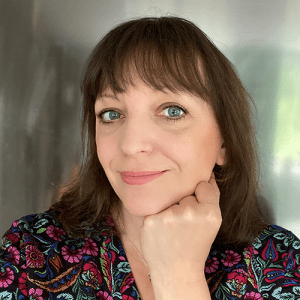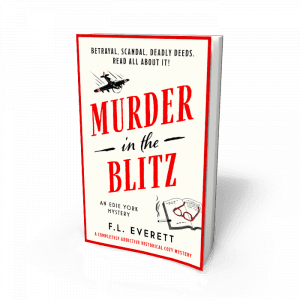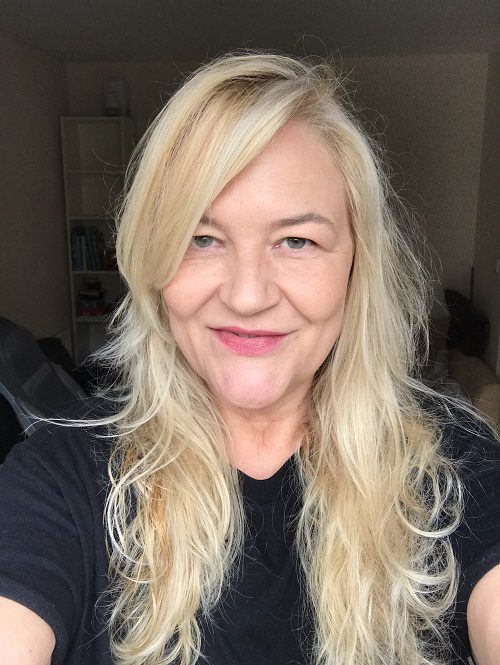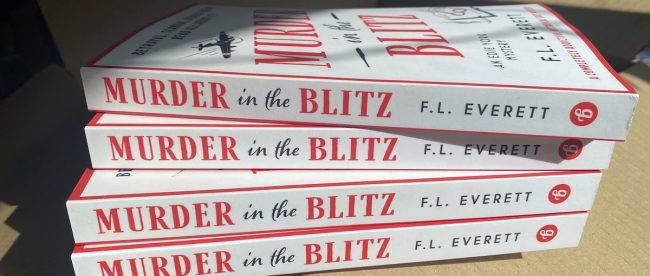Murder in the Blitz – Interview with Flic Everett
|
Listen to this article
Getting your Trinity Audio player ready...
|
A world war, a nosy journalist, and a so-called accidental death. Author Flic Everett on the first of her new murder mystery trilogy
Inspired by her love for history and cosy crime, Everett dreamed up Edie York. A Manchester-based reporter stuck answering telephone calls at her local paper. Until she gets caught up in the death of a Home Guard soldier.
Everett shares how her book deal came about, after thirty years as a journalist, how WWII became the setting for her series, and the solitude that comes with being a writer.
Who are you, and what’s going on?

F. L. Everett
I’ve been a journalist, columnist and editor for thirty years. I’ve self-published a novel and had several non-fiction books published. But during the pandemic, I turned 50, my son had long left home, I’d finally rejected the terrifying concept of getting a full-time job, and I decided it was time to concentrate on a novel I first started ten years ago, and see if I could get it published.
Writing fiction is all I’ve ever wanted to do – but with the need to earn a living it’s been hard to give it the time it needs to succeed. I felt it was now or never, so I sent a tweet in reply to publisher Bookouture’s request to see new synopses, and they liked the idea enough to follow it up. Two years later, I have a three book deal to write the Edie York series, about a brave and nosy young journalist in WWII Manchester. Who keeps getting drawn into murder investigations.
The first is out on 21 September, and book two is already written.
What aspects of your life experiences do you find yourself drawing upon most frequently as you craft the characters and plots in your crime novels?
I have been a journalist on a local paper but obviously not during WWII. People don’t change that much though, and I’ve met many people who have lent a little of themselves to the characters. In Annie, Edie’s best friend, there’s a bit of my own dearest friends – people who can sometimes annoy you, but you love them enough for it not to matter. I loved writing about Edie’s newspaper colleagues, and I believe I’ve made them up – but who knows!?
Her editor, Mr Gorringe, is a stickler for grammar – and so is my dad. So I think I’ve probably borrowed little bits here and there. In Lou, my irascible detective inspector, I can see certain elements of my husband. I didn’t think I was anything like Edie – until I described her to my best friend (‘small, nosy, won’t take no for an answer’) and she snorted.
In terms of plot, that really is made up. But I know Manchester very well, having grown up there and lived nearby until ten years ago. I now live in the West Highlands, but I go back all the time to see family and friends. The book is a bit of a love letter to my home town. I do a lot of research to find out where certain buildings would have stood in 1940, where was bombed and when. It’s given me a new appreciation for the buildings that stayed standing!
Could you share a glimpse into your writing process? How do you go about developing a crime storyline that keeps readers engaged?
I wish I had a process. Basically, I begin with the victim, and the circumstances of the murder scene, then work backwards to figure out who killed them and why. I don’t know if this is the normal path for a cosy crime writer, but it’s the only way I can do it. I spend a lot of time on long dog walks, thinking about alibis and red herrings, and I make voice-notes on my phone, like Alan Partridge. But I am a plotter, not a ‘pantser’ – I can’t imagine making it up as I go along.
I begin with the victim, and the circumstances of the murder scene, then work backwards
Before I start, I write a detailed synopsis, then I break it down into chapters. It makes the process much easier. Did I mention I’m a Virgo who packs two days before a trip, and likes to do my washing on holiday, so I come home with clean clothes? Yeah. These things go deep.
I also discuss certain things with my husband Andy, who has worryingly acute insight into how a killer’s mind might work. But largely, I just do what I’ve always wanted to do. Sit at my desk, or the kitchen table, with the cat and snacks nearby, and make it up.
Crime novels often involve intricate details and suspenseful twists. How do you approach research to ensure your stories are both captivating and authentic?
First of all, I have an amazing historian friend, Catherine Pitt (of Pitt Stops, on Facebook). She’s been absolutely invaluable with the second book, which is quite complicated and needed a lot of research. I’d message things like ‘could you get a train to London from Manchester in April 1941 without stopping?’ and she’d find out within five minutes.
I also read a lot of WWII social history books. I have an entire bookcase dedicated to them, and I find myself ordering even more. At first it was just the basics, but now I’m getting into the obscure, white-label imports. I love reading about it, and I hate the feeling that I might be getting things wrong. I like my fiction to be rooted in genuine history. I also watch films set during the war, like Mrs Miniver and This Happy Breed. They’re invaluable for getting dialogue and class issues right. I have been to the Imperial War Museum North in Salford and the Police Museum in Manchester, both of which are incredible repositories of historic research. And then, of course, there’s Google.
I love reading about [WWII], and I hate the feeling that I might be getting things wrong. I like my fiction to be rooted in genuine history.
In terms of plot, I love reading crime and have done since I was ten. I tend to think ‘would I guess the killer? And if so, would I guess why?’ and having read so much Golden Age crime is a real help in terms of pacing and plot twists.
With three crime novels in the works, have you planned out all of them in one go? Or will you wing it?
No, one at time, although I do have a rough idea of the general themes of each one. I’ve just written the plot synopsis for book three, so I’ve done the hard work. Now I just have to write it.
Read more interviews – Joe McGann’s sober companion: an interview about an intervention
Many writers find inspiration from other art forms, like music or visual art. Are there any unexpected sources that have influenced your approach to crime fiction?
Yes. I think being a journalist means you’re interested in lots of different things, and I love a bit of culture. There’s reference to the arts in all of the books so far. I love researching the cultural aspects of life in the war – what they’d have seen in galleries, or at the pictures, and what music and theatre they’d enjoy. I spend a lot of time on YouTube doing ‘research.’
And of course, Edie herself is an avid reader of crime novels, so that’s fun too. Though I have to check the publishing dates to make sure she’d have been able to get them from Boots lending library.
As you’ve transitioned into novel writing, have you discovered any surprising challenges or unexpected joys that differ from your previous work?
It’s all joy so far, apart from structural edits, which mean changing bits around like a Chinese puzzle, only to find your small alteration has messed up an entire sequence of chapter. Other than that though, I love everything about writing novels. It really is the dream. All I want in life is to be left alone to make stuff up. And to make enough money to run an animal sanctuary for abandoned cats, dogs, horses, donkeys, pygmy goats…
Writing can be a solitary endeavour. Do you find opportunities to connect with other writers or readers to discuss your ideas and thoughts? Or just crack on alone?
Being a freelance journalist is pretty solitary these days too. It’s not like when I began back in the ‘90s, when I was going all over town interviewing people in their living rooms. I love people and like to think I have lots of friends, but not when I’m working. I’m extremely solitary as a writer, like some toiling spider in a dark corner.
It’s not like when I began back in the ‘90s, going all over town interviewing people in their living rooms
I can’t imagine being in writer’s groups and getting ‘feedback.’ Other people’s opinions are the kiss of death, and make me doubt myself. I’d much rather crack on, then find out what they think after it’s published!
I don’t even like writing in public places like cafes. The noise! And the people! I’m much happier with a cup of tea and deafening silence. Apart from the pets snoring.
Crime novels often explore the darker aspects of human nature. How do you approach delving into these themes while keeping the narrative engaging and not overly grim?
‘Cosy’ crime is a very specific genre – there are rules. You can’t kill children or pets, and you don’t want anything too grisly at the murder scene. It’s more interesting to me to look at the psychological factors at play with crime, than peer at viscera on the pathologist’s slab. I’d always rather watch Endeavour than Silent Witness. So, I adhere to the principle of ‘if the audience doesn’t need to see it, don’t show it.’
Can you share a pivotal moment or realisation that pushed you to pursue crime fiction as the genre for your novels?
It’s what I love most as a reader. I think for a long time I was scared to attempt it. I knew nothing about the police or prison, and I wasn’t sure I could make it authentic in any way. Then I realised I could set it in the past, and suddenly I felt freed up to write the sort of book I would love to read.
I think it really began, though, in the school library when I was eleven. I was lurking in there one rainy lunchtime, and came across the Agatha Christie classic, The Murder of Roger Ackroyd. Well, it blew me away. I had never read anything so gripping or surprising.
My wonderful grandma was a huge classic crime fan, and she introduced me to the rest of Christie, and then Sherlock Holmes stories, and Ruth Rendell. I have loved crime novels ever since, and always dreamed of writing one. I think most crime fans really love the fact that within the boundaries of a novel, calm is brought to chaos. The world is an alarming and random place, but a great crime novel narrates the pursuit of truth and justice, and ends with the case closed. It all goes back to my holiday packing, really. I like calmness and order. And I like to know everything.
In a rapidly evolving literary landscape, what do you hope your crime novels bring to readers that sets them apart and makes them memorable?
 I hope they’ll invest in the character of Edie, and in her life during wartime. It’s not so long ago, but in many ways it was such a different world. I’ve tried to bring some lightness to it, as well as the darkness. My grandparents lived through the war and were both very funny. I think a lot of WWII set books overlook the fact that people made jokes, and had little irritations about queuing and sandwiches, as well as dealing with the big things. So I hope the characters feel real, and that the Manchester setting is a reminder that the war didn’t just happen in London. It was everywhere, and everyone suffered in different ways.
I hope they’ll invest in the character of Edie, and in her life during wartime. It’s not so long ago, but in many ways it was such a different world. I’ve tried to bring some lightness to it, as well as the darkness. My grandparents lived through the war and were both very funny. I think a lot of WWII set books overlook the fact that people made jokes, and had little irritations about queuing and sandwiches, as well as dealing with the big things. So I hope the characters feel real, and that the Manchester setting is a reminder that the war didn’t just happen in London. It was everywhere, and everyone suffered in different ways.
I hope they enjoy trying to solve the mysteries that Edie finds herself wandering into, and lastly, I hope they like the dog. Of course I had to include one.
Murder in the Blitz by F.L. Everett is available for purchase on 21 September as in paperback, audio, and ebook.

Sam is Silver’s founder and editor-in-chief. She’s largely responsible for organising all the things, but still finds time to do the odd bit of writing. Not enough though. Send help.



Leave a comment